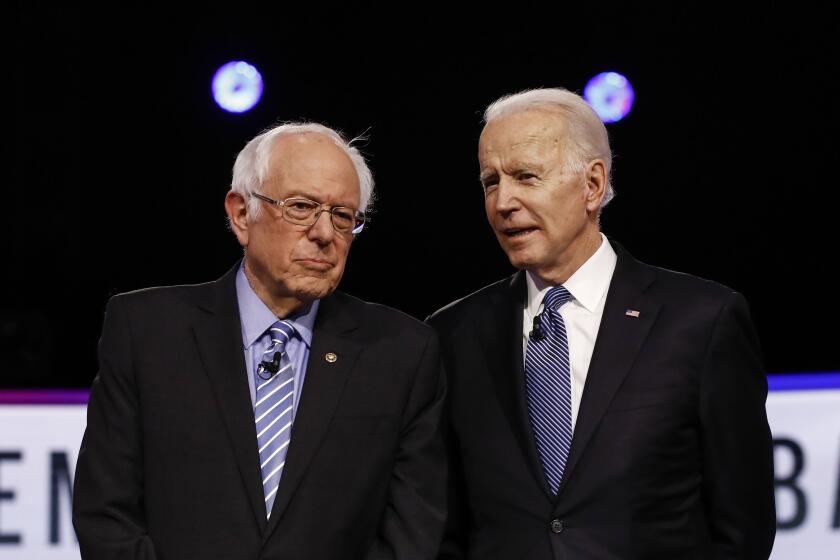Joe Biden proposes expanding Medicare eligibility and student debt relief

WASHINGTON — In a peace offering to progressives a day after Sen. Bernie Sanders quit the presidential race, Joe Biden announced support Thursday for an expansion of Medicare and education policies that move closer to his former rival’s agenda.
Biden, the presumptive Democratic presidential nominee, proposed expanding government health insurance coverage by lowering the eligibility age for Medicare from 65 to 60.
The former vice president also called for forgiving college debt for low- and middle-income borrowers at public colleges and universities as well as at minority-focused private institutions.
Both proposals are less expansive than Sanders’ campaign proposals, which would provide Medicare for citizens of all ages and cancel student debt for all borrowers regardless of income. But they go further than Biden’s previous plans, and he gave Sanders credit for inspiring his new policies.
“Senator Sanders and his supporters can take pride in their work in laying the groundwork for these ideas, and I’m proud to adopt them as part of my campaign at this critical moment in responding to the coronavirus crisis,” Biden said in a Medium post.
It is not clear how much the proposals will help Biden win over Sanders supporters. The senator’s campaign press secretary, Briahna Joy Gray, said on Twitter that “Joe Biden’s plan is inadequate” and should be changed to win the trust of young voters.
With Bernie Sanders out, Joe Biden must energize a divided Democratic Party that is distracted by the coronavirus and a ravaged economy.
The proposals are the latest of several steps Biden’s campaign has taken to reach out to the party’s progressive wing over the last month as he has come closer to clinching the nomination.
The effort has taken on urgency now as Biden seeks to unify the party after a long primary battle. Many of the Vermont senator’s followers view Biden as too centrist and tied to a discredited establishment.
In previous policy overtures, Biden embraced bankruptcy reform policies backed by Sen. Elizabeth Warren of Massachusetts, another progressive former rival for the 2020 nomination. He proposed a Sanders-inspired plan to provide free tuition at public and community colleges, but to a more limited population.
And he embraced Warren’s proposal to forgive $10,000 in student loan debt for every borrower to provide relief amid the coronavirus outbreak.
Going further in his debt relief plan Thursday, Biden is calling for forgiving tuition-related debt for borrowers earning up to $125,000 income if they attended public colleges or universities, private historically black colleges and other institutions serving minority students.
Noting the coronavirus pandemic that has ravaged the public health system and the economy, Biden said the proposals “will not only help people right now when they may need the help most, but will also help people find more secure footing in the long term once we have emerged from this crisis.”
The Medicare proposal marks movement by Biden in a policy area that has been a central battleground of the Democratic primary.
“Medicare for all” was a marquee issue for Sanders and backed by Warren. But Biden opposed it, saying it was too expensive and unlikely to pass Congress. He instead called for expanding the Affordable Care Act by offering a public health insurance option that anyone could purchase if they are unhappy with their commercial health plan option.
In his new proposal, Biden wants to lower the eligibility age for Medicare in addition to the public option. He said it would help people who want to retire before 65 or want to leave their employer plans, as well as provide an insurance backstop for older workers in the post-coronavirus economy.
“It reflects the reality that, even after the current crisis ends, older Americans are likely to find it difficult to secure jobs,” Biden said.
More to Read
Get the L.A. Times Politics newsletter
Deeply reported insights into legislation, politics and policy from Sacramento, Washington and beyond. In your inbox three times per week.
You may occasionally receive promotional content from the Los Angeles Times.












